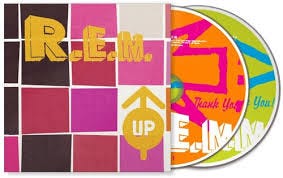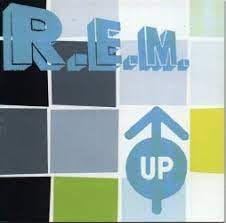Maybe the press narrative for Up, R.E.M.’s 11th studio album, sealed its fate. The album was recorded in early 1998, after founding drummer Bill Berry left the band. In almost all the media accounts around its October release, the loss of Berry – a subtle timekeeper who’d suffered a brain aneurysm while touring, and stepped away during his recovery – was the focus.
In preview pieces and interviews, fans were told to expect a “transitional” album. Critics derided what they heard as “confusion” – Pitchfork’s review described the band as “doomed to wandering the creative seas, looking for new sounds to explore. Sadly, when they find new sounds, they don't do enough with them, resulting in a distant, impersonal record.”
It was the most facile of “if/then” conclusions: Many in the press looked at what was going on within the band and drew sweeping conclusions about the art – which, to be sure, did sound different from the previous work, the beloved New Adventures in Hi-Fi. Up was airy, a dreamlike reverie that was hard to pin down. It had thick, overlapping layers. Compared with New Adventures and other, more pulse-forward R.E.M. efforts, it was a different kind of listening experience. (That’s code for “a teensy bit challenging.”)
Up parachuted back into view last week, via a 25th anniversary remastered version complete with unreleased live performances. The remastering sharpens the mixes, exposing details (keyboards, hand percussion, etc.) that maybe were obscured on the initial release.
But the songs remain the songs. And the Wrecking Crew-inspired arrangements are exactly as vast and gorgeous as they were in 1998. Which means that Up, misunderstood then, will probably be misunderstood now, for the same reasons. Either way, it represents something that was once commonplace in popular music and is now lamentably exotic: Experimental lunges as an integral part of the ride.
R.E.M.’s extended run, which some have said essentially ended with Up, is a powerful illustration of this. Emerging with a blend of placid Byrds chime and off-kilter Velvet Underground guitars on its 1983 debut EP Murmur, R.E.M. released a studio album every year for the next seven years. That itself is of course a luxury these days, but the quartet didn’t just work hard, it was deliberate about growth, about cultivating an internal ethos of change. The band toured aggressively as well, and drew lessons from what felt good on stage – what felt good to the four of them, crucially, not necessarily what “worked” with audiences. Though characteristic R.E.M. songwriting tactics carried from one work to the next, the albums inhabited (and exhausted) very different moods – Fables of the Reconstruction, produced by the legendary Joe Boyd, captured traveler’s restlessness in melancholy tones; Document, which included the careening single "It's the End of the World as We Know It (And I Feel Fine)," blasted away at complacence from all angles, through both the music and the ever-cryptic lyrics.
Then came huge commercially successful projects – 1991’s Out of Time (propelled by the ubiquitous single “Losing My Religion”) and the more meditative Automatic For the People the following year. Then came a strange garage-rock detour, Monster, and then New Adventures.
To dismiss Up as some kind of errant experimental dalliance is to ignore R.E.M.’s entire history: The tone of this band changed from record to record. The canvas itself changed. Michael Stipe’s narrative devices went in many directions depending on the surroundings – nonsense rapid-fire lists for one song, expressions of disarming poignance for the next, sly pop-culture homages to Andy Kaufman existing alongside obscure inside jokes and winks at the catalog. Every time I hear “Lotus,” from Up, the world stops when Stipe sings “dot…dot…dot, and I feel fine.”
In a recent interview with Rolling Stone, bassist Mike Mills pushed back on the notion that Berry’s departure was the catalyst for Up’s expansiveness. “We had already decided that a lot of the old rules were out, especially when it came to songwriting and creating the songs. When Bill left, it just really hyper-accelerated that process.”
That’s audible instantly. Up opens with a jarring gauntlet – a diffuse electronic tableaux called “Airport Man” that is like nothing else in the R.E.M. catalog. The words, such as they are, come in whispers through a haze of drone tones; nothing is “foreground” and everything is static, halfway noise-cancelled, trampled by other sounds. Put this on the next time you’re walking an airport concourse; it’s uncanny how completely this piece from 1998 anticipates the isolation of air travel in 2023.
Revisiting Up, I was surprised at the thickness of all the atmospheres: When the three principals of R.E.M. set out to evoke a particular mood – say, the noirish and vaguely sinister shadows of “Suspicion” – they go to extremes, adding deep tremolo guitar figures and a shimmering vibraphone to provide a filmic and illusory sense of calm. The “stretch” of a song like that isn’t just the composition – it’s reflected in the smallest orchestration decisions, where the voices sit in the mix.
And speaking of vocal blend: Arguably the biggest stretch on Up is “You’re In the Air,” a sentimental love song that more than one reviewer described as a homage to the Beach Boys. The vocals there (and on “At My Most Beautiful,” an even more obvious tribute) are plenty lavish in that way, but they don’t simply recreate the plush Brian Wilson consonance – listen for brief twinges of ear-snagging dissonance. And then there is the Stipe melody, a simple, breathless ascending scale that feels like it had to be written alongside “Help Me Rhonda” but is way less conventional in its symmetries. It’s an astonishing moment, ravishing and delicate, angelic and searching. It celebrates the chain of influence upon which all music depends while adding something irrefutably original. In the long history of R.E.M., it’s just another lunge, the notable pivot that baffled some professional listeners. That doesn’t make it any less stunning.








Thanks for this, I’ve never delved deeply into their catalog and the rerelease and this article gives me a good reason to do so.
Excellent piece, Tom. It's been enjoyable to have all of the Up defenders come out of the woodwork since this reissue was announced a few months ago. I'm enjoying the new mix, but wish there was better bonus content besides a live set, cos this record deserves more.